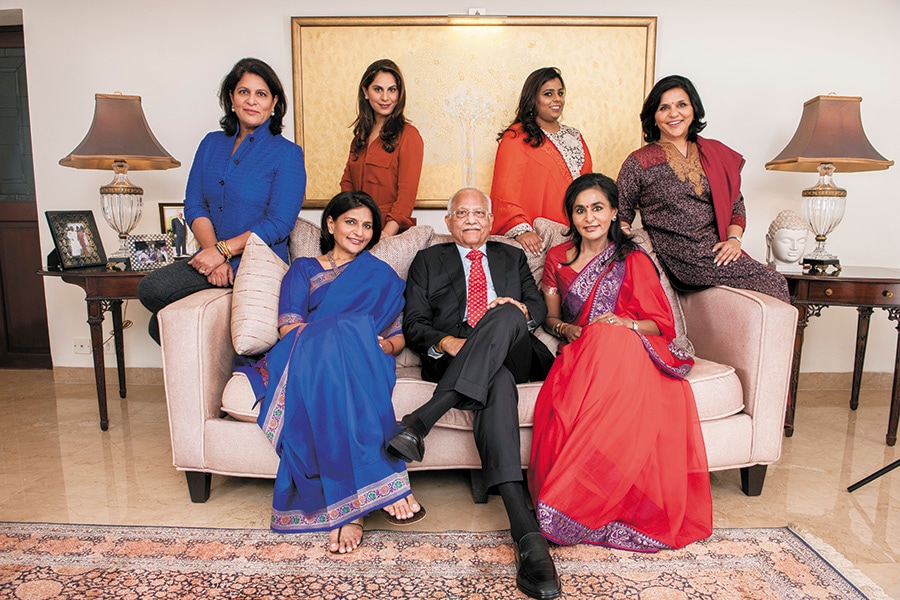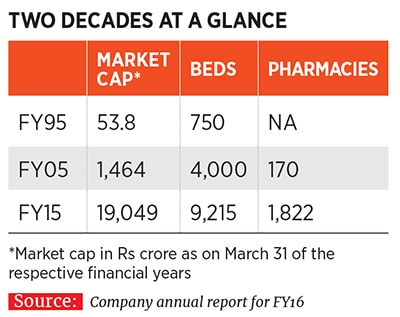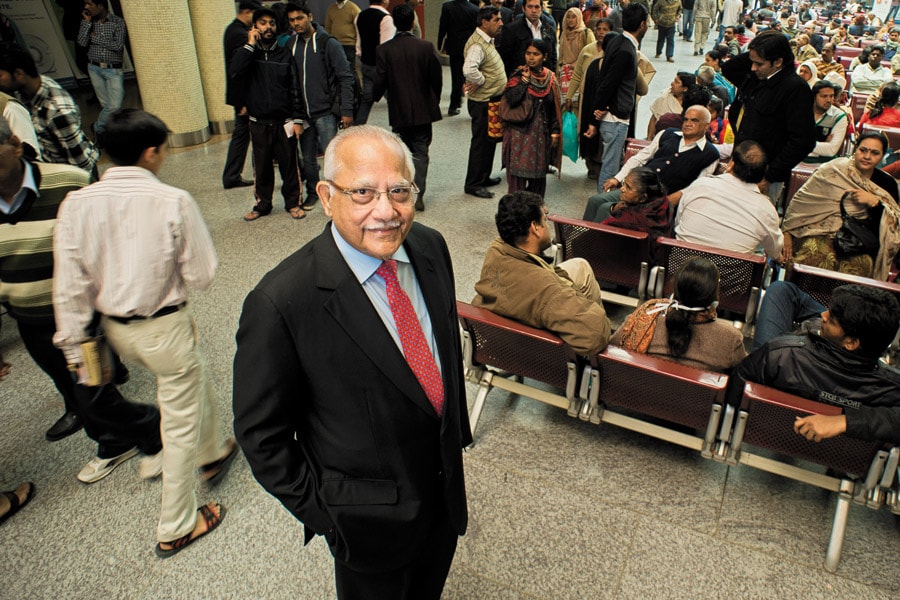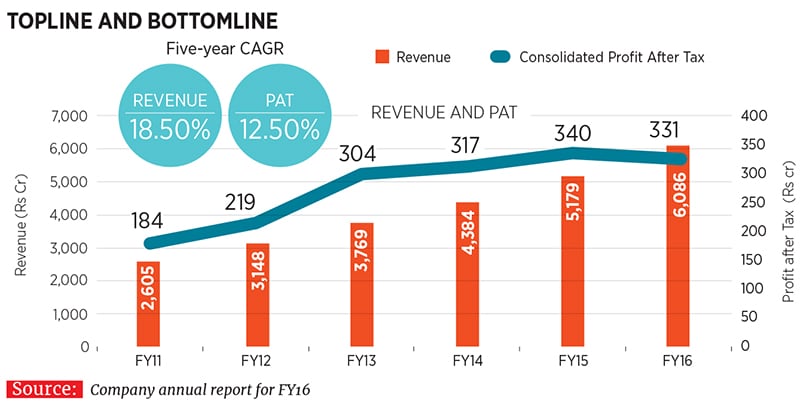On February 1 this year, Dr Prathap C Reddy, founder and executive chairman of Apollo Hospitals Enterprise Ltd (AHEL), and his wife Sucharitha Reddy celebrated their 60th wedding anniversary in Chennai. Almost the entire family—including four daughters, 10 grandchildren and three great grandchildren—was in attendance. Not only for the momentous personal occasion, but also because the day held significance for the legacy of their family business, nurtured for over four decades by the 84-year-old patriarch.
“That’s the date of our [family] constitution—a preamble of dad’s wish, ideas, vision, and how we would all stay together. We actually signed a memorandum of understanding [on that day],” Shobana Kamineni, executive vice chairperson of AHEL, tells Forbes India. Shobana, 56, is Reddy’s third daughter and employee number 2 or 3—she’s forgotten which one—at AHEL. “All that is being done now [on the constitution] is the fine-tuning and the legality of it.”
This is an expected step by Reddy, who has avoided ambiguity on succession and structure issues from the get-go. Three years ago, he had spoken to Forbes India about a rotating chairmanship model for his four daughters. Now, defining how the family should work together has taken on greater significance with some of his grandchildren assuming key roles at AHEL.
However, the entry of the third generation into the family business would be on merit and based on their “natural affinity” towards health care, says Preetha Reddy, 59, executive vice chairperson of AHEL and the eldest daughter, who will be the next executive chairperson as per the family constitution.
But Reddy is not just trying to preserve a legacy. He wants the future generation to build on it. Because he remembers how it all started.
The first 150-bed multi-specialty Apollo Hospitals was operationalised on Greams Road, Chennai (then Madras), in 1983, with an investment of Rs 30 crore. Of that, Rs 5 crore was spent on importing and installing a CT scan machine. A large portion of the project cost was taken on loan from five public sector banks, after a go-ahead from then Union Finance Minister Pranab Mukherjee. About Rs 3 crore was secured through foreign exchange borrowings from American Express.
Thirty-four years on, the Apollo Hospitals growth story has become a case study at American universities. “My son who goes to college in the Boston area said his graduating class actually had to do the Apollo Hospitals case study,” says Shobana. In fact, Harvard Business School has done at least two case studies on AHEL—first in the late ’80s and early ’90s, and then again in 2000. “The original study by Harvard was a bit sceptical on whether this man [my father] could do it [build a profitable corporate hospital chain]. But when they came back in 2000, it [AHEL] was a very powerful [health care] model,” she says.
“The group has led various innovations—new business models beyond multi/super specialty hospitals clinics for primary care diabetes care dental and birthing centres telemedicine and retail pharmacies, among other plays. Each of these plays has become a pioneer in their respective industry segments,” says Prashant Jain, director-health care, at investment bank o3 Capital.
This reflects in the numbers. For FY16, the company reported a profit of Rs 331 core on a revenue of Rs 6,085.6 crore, registering a year-on-year decline of 2.61 percent and a growth of 17.5 percent respectively. And for the April to December period of FY17, revenues (standalone) stack up at around Rs 4,800 crore with a profit of approximately Rs 240 crore.
![mg_94645_apollo_280x210.jpg mg_94645_apollo_280x210.jpg]()
AHEL, with just one operational hospital in Chennai, was the first corporate hospital in India to be listed in 1983 and raised Rs 1.7 crore. Today, adds Jain, it is the most valuable hospital company in India with a market cap of approximately $2.8 billion. “From shareholders’ returns perspective, Apollo Hospitals has returned 22 percent annualised returns for the last 20 years,” he says. At Rs 1,315.90 apiece as of March 3, the company’s share price has seesawed between Rs 1,412.15 and Rs 1,143.55 over the last 15 months.
With over 10,000 beds across 71 locations in India and abroad (two hospitals, one each in Dhaka and Muscat) in service, apart from pharmacies, primary care and diagnostics clinics, and telemedicine units, AHEL, which provides care in over 55 specialities at its larger hospitals, is now working on its next big project: A Rs 1,000-crore cancer treatment and research facility, Proton Treatment Centre, in Chennai, which is expected to become operational in 2018.
The facility will give patients access to the cutting-edge Proton Beam Therapy, which is an advanced radiation treatment for removing tumours (the malignant ones) from the head, neck, brain, pancreas and prostrate. It also aims to develop cancer control strategies such as finding newer methods in cancer prevention, diagnosis and treatment. This is among many firsts by AHEL. Since 2012, the hospitals have performed over 3,000 robotic surgeries.
AHEL has also entered into a collaboration with Singapore-based venture capital fund Jungle Ventures, which is investing in health care startups. For this, AHEL is setting aside a small investment corpus. The intent of this tie-up is to test the practical applicability and scalability of what these health care startups are creating, within the Apollo network.
A Turning Point
After getting his MBBS from Stanley Medical College in Chennai, Reddy, in 1961, joined the Worcester City Hospital, Massachusetts, where he was the resident doctor for two years and chief resident doctor for a year. He followed this up with a fellowship in cardiology at Massachusetts General Hospital, Boston (1964-1966), after which he was involved in research programmes at the Missouri State Chest Research Hospital.
He returned to India in 1970 and joined HM Hospital, a new 40-bed facility in Chennai. “By the third year I was very busy. Even people who had had heart attacks, but never came to us, used to come to me for opinions,” recalls Reddy, who would see about 30 to 40 patients a day. Even as he grew in stature as a cardiologist, it was an incident in 1979 that changed his life forever.
A 38-year-old patient of Reddy’s lost his life, leaving behind his wife and two children. “That scene flashes back to me: The wife on one side and the two children on either side of her, hugging their mother and crying,” says Reddy. The man could not raise enough money to go overseas for a bypass surgery. “Few hospitals were doing it in India then, but even that [standard] was not acceptable. I thought how many more people are going to die because how many can raise thousands of dollars to travel abroad for treatment? Only the rich and powerful could afford it then.”
![mg_94643_prathap_c_reddy_280x210.jpg mg_94643_prathap_c_reddy_280x210.jpg]() The dismal health care situation prompted Dr Prathap Reddy, founder and executive chairman of Apollo Hospitals, to build multi-specialty hospitals
The dismal health care situation prompted Dr Prathap Reddy, founder and executive chairman of Apollo Hospitals, to build multi-specialty hospitals
Image: Amit Verma
Thereafter, he was a man with a mission. For the next four years, he was single-minded about building a multi-specialty for-profit, private hospital in Chennai. There were, of course, the inevitable hurdles in terms of government regulations. Medical equipment carried a customs duty of 370 percent and funding for building hospitals was not readily available from banks, while foreign capital was not allowed.
In early 1982, the late Congress Party leader GK Moopanar facilitated a meeting for Reddy with then Prime Minister Indira Gandhi. He took the opportunity to apprise her of the dismal health care situation. “I told her that the powerful people in the country get a free Air India ticket and as far as the rich are concerned, it doesn’t matter what it costs. But for all the others, there is no good care in India—government hospitals can’t afford quality care and private hospitals don’t have good facilities,” he remembers telling her.
Over the next 24 months, he made over 50 trips to New Delhi to get various approvals and sanctions to start his first hospital in Chennai. In the process, he developed a good rapport with Indira Gandhi and later with her son Rajiv. He had even invited her to inaugurate the first hospital in Chennai in 1983, but she declined, asking him to request then President Giani Zail Singh instead.
“The movement of organised health care and corporate hospitals in India, which also led to an unprecedented wave of entrepreneurship in this sector, clearly rose with Dr Reddy,” says Vishal Bali, chairman, Medwell Ventures, a speciality home health care service provider and former CEO of Fortis Healthcare Ltd. “His vision for health care has been transformative.”
Of Early Starts
While Reddy was working the corridors of power in New Delhi, his four daughters—Preetha, Suneeta, Shobana and Sangita—were playing a pivotal role in helping their father achieve his dreams. In fact, points out Preetha, their baptism began much earlier, when Reddy was practising at HM Hospital.
“We love telling him that we were cheap labour,” smiles Preetha. Every Sunday, between 11 am and 1 pm, the girls were tasked with talking to patients and finding out what needed to be improved at HM Hospital. The first negative feedback they got was about the toilets—they were terrible! On learning this, Reddy spent from his own pocket to fix them. “At Apollo, all of us always check the bathrooms because it has been ingrained in us for so long,” says Sangita, 54, joint managing director, AHEL, and the youngest of the four siblings.
Over the weekends too, the girls were put to work. They had to escort patients, who would come for check-ups, from test to test.
Patient care, to that extent, became a way of life. “If there was somebody who was extremely sick, we were living and breathing that [situation], because dad was worrying about it and mom was praying for that patient,” says Preetha, who wanted to become a doctor. She had even secured a seat at the prestigious Madras Medical College, but Reddy dissuaded her from taking it up. He had wanted her to get married, “settle down”, as it were. Preetha then got married at the age of 19, and was the last of the four siblings to formally join AHEL in 1989 as joint managing director. In 1993, she was elevated to the post of managing director which she held till 2014. Under her stewardship, the company’s revenue grew from a mere Rs 25.18 crore (in the 18-month period between 1989 and 1991) to Rs 3,884 crore (standalone) in FY2014.
![mg_94647_apollo_hospital_280x210.jpg mg_94647_apollo_hospital_280x210.jpg]()
“Shobana literally wrote down every dream my father had Suneeta was with him for all his investor presentations and that is ingrained in her and Sangita just jumped in soon after college,” says Preetha of the early days.
The story goes that Reddy had commissioned the architect of his home in Chennai to build his first hospital in the city. Obviously, the architect had no clue about how to build a multi-specialty hospital, let alone a general hospital.
Shobana, who had aspirations of becoming an architect, decided to help out. As Reddy explains, “She would go and interview 10 doctors from the emergency ward, take their inputs and then help the architect put it in the drawing. She would ask surgeons what they wanted in their operating theatres and the feedback would be given to the architect.”
By the time Shobana was 27, she had overseen the development of Apollo Hospitals in Chennai, Hyderabad and New Delhi. She also heads Apollo Pharmacy, which currently constitutes 45 percent of AHEL’s turnover and is also a whole-time director on the board of Apollo Munich Health Insurance, the health insurance arm of the Apollo group. “I think we [the sisters] built Apollo Hospitals like promoters, almost shoulder to shoulder with dad,” says Shobana, who continues to steer the planning, design and execution of new projects within the group.
In fact, even the Apollo brand was thought of by Reddy’s second daughter, Suneeta, 57, who is the current managing director of AHEL.
Advertising agency RK Swamy was hired to create a brand identity in 1981-82, when Suneeta was in her final year at Stella Maris College in Chennai. The agency had come up with a few Sanskrit names such as Dhanavantri. But Suneeta was not convinced. She felt those would not resonate with her father’s idea of a modern multi-specialty hospital. She started researching for a name herself and stumbled upon Apollo, the Greek God of healing and medicine. “It sounded good. Also the word Apollo would come easier to people than a Sanskrit word,” says Suneeta. She, too, had abandoned her desire to get a master’s in business administration from the US. Her father would not allow it, she says. “He said it would be hard to find a husband who would be more qualified than me.”
Also, by the time the first Apollo hospital started, she knew that there was no career outside of it. “My father actually needed us and all of us had different talents,” says Suneeta, whose forte is finance. She was instrumental in getting Schroder Capital to invest Rs 30.80 crore for a 49 percent stake in the erstwhile Indian Hospitals Corporation Limited (IHCL), which was part of the family business, in 1995. (IHCL was amalgamated into AHEL in 2000. Schroder Capital held an equity stake in AHEL till 2005.) A decade later, in July 2005, she successfully helped AHEL raise about Rs 300 crore through the sale of global depository receipts.
Sangita, on the other hand, “is really a people’s person and she started off by handling divisions like housekeeping”, says Suneeta. As executive director-operations for almost two decades, Sangita has been overseeing the human resources division of the group. In 2014, she was re-designated joint managing director and assumed greater responsibilities, one of which is to enhance the IT-enabled patient-centric operations across the group.
In 2016, AHEL developed a digitally enabled personal heath record for patients that can be viewed on a mobile device—anytime, anywhere. “We use the data for data analytics and create predictive algorithms which proactively through the mobile phone connect patients to health information messaging,” says Sangita. This feature is part of the Ask Apollo app and website through which patients can also book appointments, undertake e-consultations, and request for at-home health care services.
Sangita also sees to the operations of Apollo Health & Lifestyle Limited (AHLL), a subsidiary of AHEL, which operates a chain of clinics under the brand Apollo Clinics diabetes management clinics, Apollo Sugar diagnostic centres, Apollo Diagnostics and birthing centres, Apollo Cradle, among other health care retail formats. Last year, International Finance Corporation invested Rs 450 crore for a 29 percent stake in AHLL, valuing the company at Rs 1,860 crore.![mg_94649_apollo_multy_speciality_hospital_280x210.jpg mg_94649_apollo_multy_speciality_hospital_280x210.jpg]()
“Each one has taken on a set of responsibilities which I think is good. That division of responsibility is a sign of how collaborative and harmonised they are,” says Biocon Chairman and Managing Director Kiran Mazumdar-Shaw, who knows the family well. Adds Bali of Medwell Ventures, who has known Reddy’s daughters for the last two decades, “Each one of them brings their individual and distinct acumen to the growth of the company.” Sangita likes to put it this way: “It’s always nice to check out a financial idea with Suneeta, talk about something entrepreneurial with Shobana, and look up to Preetha to build on those ideas.”
But it isn’t always sunshine for the sisters, especially on business decisions where it’s impossible for all four to be in agreement all the time. “It’s not always smooth,” admits Shobana. “All four of us are very aligned with our end points, how we reach there is each one’s specific style. I’m very direct Sangita is very collaborative, Preetha is statesman-like, and for Suneeta everything is based on rational thought.”
Sewing a bond
None of the four siblings are either practising doctors or have had formal business education. Everything that they have learnt has been on the job, including management lessons. Preetha recalls one such lesson learnt in the mid-’90s. The finance department had presented her with spread sheets that showed how a very senior doctor at the Chennai hospital was not performing according to his goals. “I walked in to the doctor’s office and said this is the data I have, and I don’t think this is right,” she says. She admits to being a little rough around the edges, and “the doctor took offence and quit”. Reddy did not interfere but he did tell Preetha that the most important customer for Apollo is the doctor. “I think that lesson has taught all of us to really respect the doctors. And I’m hoping that the next generation and the next set of managers are always cognisant of this,” says Preetha, who had suggested the rotating chairmanship model idea, which was endorsed by her three younger sisters and Reddy.
“One of the biggest challenges for the next generation is how to keep the flock together. She [Preetha] is a very mature and balanced individual and someone who can keep them together,” says Sunil Shah, founder of consultancy firm Evergreen Family Business Advisors.
Of Dr Reddy’s 10 grandchildren (three girls and seven boys), two of them, Sindoori Reddy, 34, COO, AHEL, and Upasna Kamineni, 30, vice chairperson (CSR), AHEL, and MD, Apollo Life—daughters of Suneeta and Shobana respectively— are actively involved in the business. While Sindoori oversees 13 hospitals in the southern region, Upasna looks after the company’s CSR activities and also Apollo Life, which runs a chain of wellness centres. Sindoori, who is also the eldest grandchild, helmed the development of the first and only Apollo Children’s Hospital in Chennai, which opened in 2008-09.
Karthik Reddy, 34, Preetha’s son, works part-time in the insurance business.
The family constitution—which would be enforced through a family corporate board comprising five family members and three independent directors—would stipulate that a family member be picked based on meritocracy rather than seniority. “For those looking to work, there is a qualification needed to get into the business,” says Reddy, adding that the other grandchildren have not shown any inclination to join the business yet. This is because they have had a wider exposure to a landscape of different career opportunities, says Preetha. “With us, we didn’t know better because we worked with our dad,” she points out.
For now, both Sindoori and Upasna are building the skill sets needed to lead the company one day. It helps that the cousins share a close bond too. Ask my husband, says Upasna, who is married to Tollywood actor Ram Charan. Before they were married, he was interviewed by all her nine cousins! “We are all so closely knit and possessive of each other that it becomes a little overwhelming for the spouses,” she says.
Mazumdar-Shaw too has noted their camaraderie. “When you meet them at weddings, you can see that it is one big happy family. All the grandchildren are very close and that is a very good sign,” she says.
undefinedThe entry of the third generation into the family business would be on merit.[/bq]
However, the older generation is cognisant of the need for some structure, some documentation, that will ensure the happy picture doesn’t get marred with any discord.
Within the third generation, the age gap between the eldest and youngest cousin is almost 17 years, compared to the five-year difference between Preetha and the youngest Sangita. “The four of us had the advantage of having the same mother and father, living in the same household. So there was so much of intangible osmosis happening,” says Sangita. While they are united by a love for their grandfather, Sangita points out, “They [the cousins] must be bound by common guiding principles which is what the constitution is. It will be a powerful way to keep everyone on track.”
That said, Shah of Evergreen Family Business Advisors believes that the most important thing for any family-run business is to coach the next generation individually and as a team on how to handle conflict. “There is no evidence in the world to suggest that people are born with natural skills in knowing how to handle conflict. Today, the natural skill is to think independently and do things independently,” he cautions.
Shobana says that when Sangita finishes her term, if there is no one ready for the post, then the chairmanship could vest with a professional for a while even though she would like to see a family member in charge. “The lessons that have been learnt—from the way families have split to the way old promoters have come back and created confusion—are important,” she says. “We are observing, talking about, and trying to prevent them from creeping into our company.”
Their success is linked to their father’s confidence in them. Even though Reddy is a strong-willed man, “he’s a liberal thinker,” says Mazumdar-Shaw. “He is one person who believes in women’s empowerment in a big way. He always tells me, ‘I like strong women and you’re a strong woman. I’m so happy that my daughters are like you’.”
So far, the four sisters have been working seamlessly, drawing from each other’s strengths and growing the company in the process. The company has delivered a growth of 20 percent annually, “even after the daughters taking over the business,” points out Jain of o3 Capital.
But for the moment, Reddy still has the casting vote when it comes to decision-making. And that casting vote would move to the next executive chairman.
“Right now the orchestra is being conducted very well, and the four of us will be able to do it very well in the future,” says Preetha, who will be the first to take over the baton from their father.

 (Behind, left to right) Shobana Kamineni, Upasna Kamineni, Sindoori Reddy and Sangita Reddy. (Seated, left to right) Preetha Reddy, Dr Prathap C Reddy and Suneeta Reddy
(Behind, left to right) Shobana Kamineni, Upasna Kamineni, Sindoori Reddy and Sangita Reddy. (Seated, left to right) Preetha Reddy, Dr Prathap C Reddy and Suneeta Reddy
 The dismal health care situation prompted Dr Prathap Reddy, founder and executive chairman of Apollo Hospitals, to build multi-specialty hospitals
The dismal health care situation prompted Dr Prathap Reddy, founder and executive chairman of Apollo Hospitals, to build multi-specialty hospitals
